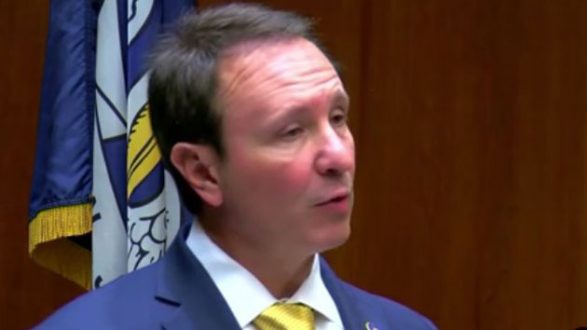
 ABCNews.com(BATON ROUGE, La.) — The two Baton Rouge police officers involved in the controversial 2016 shooting death of Alton Sterling won’t face charges in the case, Louisiana Attorney General Jeff Landry said Tuesday.
ABCNews.com(BATON ROUGE, La.) — The two Baton Rouge police officers involved in the controversial 2016 shooting death of Alton Sterling won’t face charges in the case, Louisiana Attorney General Jeff Landry said Tuesday.
In the wake of the ruling, Sterling’s family urged peace and said the people of Baton Rouge should vote in November to make their voices heard.
Sterling, a 37-year-old black man, was shot and killed on July 5, 2016, after being confronted by a pair of white police officers — Blane Salamoni and Howie Lake II outside Baton Rouge’s Triple S Convenience Store.
Some security cameras captured the incident, showing police shooting Sterling at close range, and shortly after news of his death spread, protests erupted around the country.
The conclusions on Tuesday come after U.S. Attorney for the Middle District of Louisiana Corey Amundson, last year expressed publicly that after an “exhaustive, almost year-long” federal investigation, they declined to pursue charges against either Salamoni or Lake II.
It also follows a wrongful death lawsuit filed last June by lawyers for Sterling’s five children against both officers, the police department, its chief, and the city of Baton Rouge. The suit accuses the Baton Rouge Police Department of lax training and poor procedures as factors that caused Sterling to be shot and killed.
The suit is still pending.
According to the state of Louisiana, which said there wasn’t enough evidence to bring the case to a grand jury, Salamoni gave Sterling several verbal warnings and used non-lethal force before firing his firearm.
Landry said that Salamoni believed Sterling was reaching for a gun in his pocket before attempting to use a taser on him, with no success. It was only after they tried nonlethal measures, Landry concludes, that the officers reverted to lethal force, drawing his weapon and firing three times, and then firing three more times; the last spray of bullets struck Sterling in the back.
Landry said today that Sterling “clearly matched a description” placed provided by a 911 caller, which described a man selling compact discs in front of the food mart.
Once confronted, the police officers determined that Sterling was in possession of a “firearm in his right front pocket” of a shirt he was wearing, Landry said.
That weapon, Landry later said, was a “loaded .38 caliber firearm.”
While the officers were initially able to move Sterling toward their police vehicle, Landry said Sterling “attempted to resist.”
“That’s when Officer Salamoni draws his taser with ill effect,” he said. “Mr. Sterling falls to his knees but continues to be noncompliant.”
Another attempt was made to verbally get Sterling to obey and submit to custody, but Landry said he flails and Lake II “tases him again for the second time.”
Then, Landry said, Salamoni holsters his weapon and a struggle ensues where Salamoni tackles Sterling. While he manages to get control of Sterling’s right arm, his partner struggled to get control of Sterling’s left arm.
“Both try to get control of Sterling’s hands while he continues to resist,” the prosecutor said.
At that point, Landry said, Salamoni allegedly drew his weapon again and trained it on Sterling before warning him, “If you move, I swear to god.”
The officers continue to struggle with Sterling and Landry said Salamoni is heard saying, “He’s going for a gun.”
That is when the first volley of shots are fired, hitting Sterling in the chest.
Sterling, Landry noted, rolled away and his hands were “concealed from both officers.”
That is when Sterling, Landry said, tries to get up and Salamoni “fires three more times.”
The state prosecutor said that during their 10-month investigation, including reinterviewing every eyewitness and “all the witnesses in the event,” the office concluded that Salamoni and Lake II “attempted to make a lawful arrest of Mr. Sterling” based on both probable cause and the fact that Sterling continued to resist the arrest.”
Landry said the police officers “used verbal commands” and “several non-lethal techniques to gain control of Mr. Sterling” — who he said was “under the influence” of “various illegal drugs.”
The fact that Sterling was impaired, Landry noted also “contributed to his noncompliance.”
Copyright © 2018, ABC Radio. All rights reserved.










